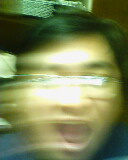Self as Necessary Fiction - Jan. 4, 2006
Self as Necessary Fiction
January 4, 2006
In our previous meetings, we have taken great pains to establish the socio-historical moments that placed Selfhood at the center of modern western social philosophy. Primary of these moments is the shift from an agricultural mode of production to capitalist which liberated identities from their feudal collective molds. Modern identities now assume the characteristic of free labor - individual and anarchic on account of the changes in society's economic life. Such tendencies are reflected in the modern philosophies of Hobbes, Locke and Rousseau. These human nature theorists put forward their own definitions of what is human reflecting the zeitgeist of their times. Hobbes and Rousseau embodied the social dystopia of early capitalist societies while Locke embraced the possibility of a liberal democratic future. They all presented various approaches to modern individualism in a period of capitalist growth and consolidation. What is common in all three is at the center of their social philosophy is an unfledging allegiance to the autonomous individual. In a philosophical sleight of hand which mimics the changes taking place in the social sphere, the individual is assumed to be separated and autonomous from collective life. Societyand the Self are regarded as separate entities. At times, even at odds with each other. This philosophical turn is not entirely surprising given the emergent logic of the economic sphere. The primary economic agent of the new social order is the autonomous individual who is able to exercise the ultimate freedoms - to labor and consume. In this sense, the self is a necessary modern fiction. However, there is an alternative perspective borne of the same tumultous period - a perspective that instead of separating the individual from society appreciates the complex dynamic between the two.


0 Comments:
Post a Comment
<< Home